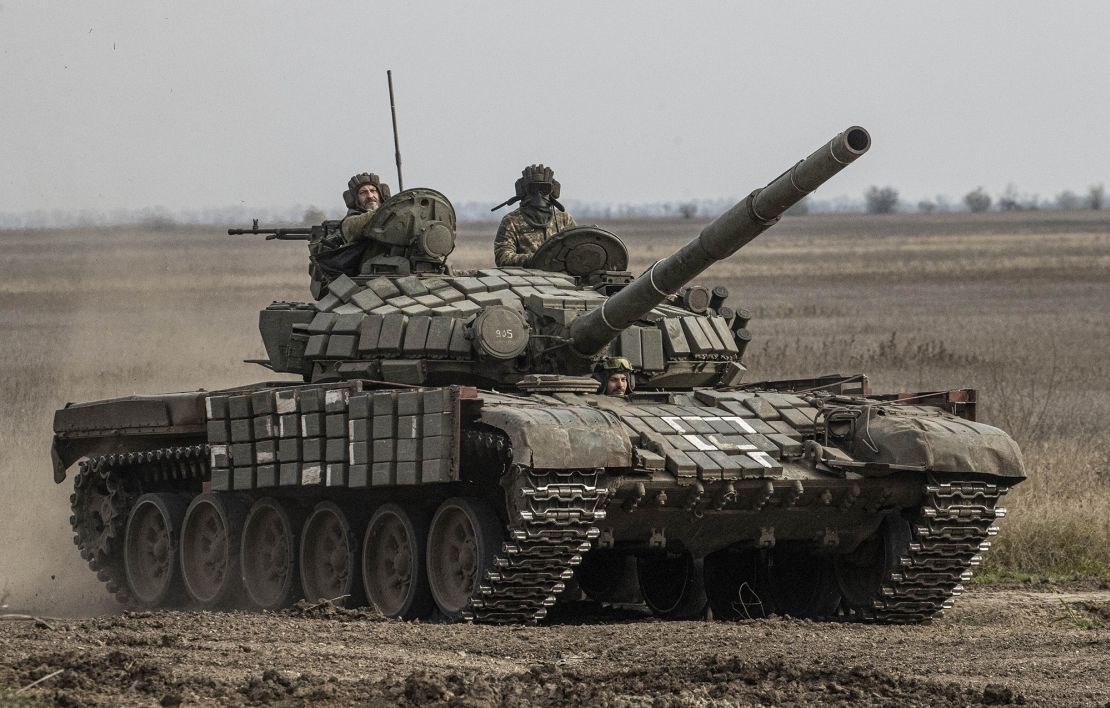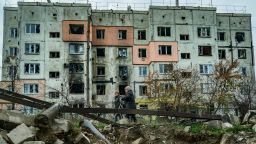Ukraine’s military said it had retaken swathes of territory in Kherson on Thursday after Moscow ordered a partial withdrawal from the area, though officials in Kyiv warned that retreating Russian soldiers could turn the regional capital into a “city of death” on their way out.
A military spokesman said that in just 24 hours, Ukrainian forces had pushed the front line in the key southern region of Kherson forward by 7 kilometers (4.3 miles) and taken control of more than 260 square kilometers of territory (100 square miles). Kyiv said it took control of the towns of Snihurivka and Kyselivka, both of which sit along key roads leading into Kherson city, the regional capital. Kyselivka is located about 15 kilometers (9 miles) away from Kherson city.
Moscow on Wednesday said its troops would withdraw from the west bank of the Dnipro River, an area that includes Kherson city, in one of the biggest military setbacks for Russia since its invasion began. A spokesman for the Russian Defense Ministry said that effort began the following day.
Officials in Kyiv, however, have treated the announcement with skepticism. Kherson is one of four Ukrainian regions that Russia attempted to annex in violation of international law, and some doubt that Moscow would give up fighting for a territory filled with people that Russian President Vladimir Putin vowed would be Russian citizens “forever.”
Ukrainian officials are also concerned that the Russian military will embrace scorched earth tactics and leave behind a trail of devastation in the wake of their withdrawal. Mykhailo Podolyak, an adviser to Ukrainian President Volodymyr Zelensky, alleged Thursday that Russia “wants to turn Kherson into a ‘city of death.’”
The Russian military “mines everything they can: apartments, sewers. Artillery on the left [eastern] bank plans to turn the city into ruins. This is what ‘Russian world’ looks like: came, robbed, celebrated, killed ‘witnesses,’ left ruins and left,” Podolyak tweeted.
Ukraine military spokesman Vladyslav Nazarov said Russian forces were continuing to shell areas recaptured by the Ukrainian military and attempted to strike humanitarian aid distribution points.
However, signs of the retreat have begun to emerge.
Gen. Mark Milley, the chairman of the US Joint Chiefs of Staff, said Washington had seen the “beginnings” of a Russian withdrawal in Kherson. Satellite imagery taken last week of Russian-occupied Crimea showed trenches being dug near the border with Kherson, a possible sign that Russian military leaders are nervous about the progress of Ukraine’s counteroffensive.
Ukraine’s President Volodymyr Zelensky said more than 41 settlements in southern Ukraine have been liberated following Russia’s decision to move to the eastern side of the Dnipro river.
He added that police units had moved into several settlements in Kherson to begin stabilization measures, but the liberation of Ukrainian territory was just the first step in a long process.
Ukraine’s commander-in-chief, Valerii Zaluzhnyi, said Kyiv’s military success in Kherson left Russia with “no other option but to resort to fleeing.” When asked if the withdrawal was actually taking place, Zaluzhnyi said Ukrainian authorities could neither confirm nor deny it. But defending occupied territory on the west bank of Kherson had become increasingly difficult for the Russians as Ukrainian forces disabled bridges across the Dnipro and attacked Russian supply lines.
While Russia’s top military leaders attempted to put the best possible face on the withdrawal, it is undoubtedly a major and humiliating setback for the Kremlin.
“I understand that this is a very difficult decision, but at the same time we will preserve the most important thing – the lives of our servicemen and the overall combat capability of the grouping of troops, which is futile to keep on the right (west) bank in a limited area,” said General Sergey Surovikin, the recently appointed commander of the war effort.
If and when Russian troops do withdraw to the east bank, their supply lines will become easier to manage and they will regain defense in depth. Any attempt by Ukrainian forces to cross the Dnipro could be costly to the point of prohibitive.
Russia would still retain control of 60% of the Kherson region, including the coastline along the Sea of Azov. So long as Moscow’s troops control and fortify the Dnipro’s east bank, Ukrainian forces will struggle to damage or disrupt the canal that carries fresh water to Crimea.

On Thursday night, several social media accounts in Kherson spoke of explosions along the river on Thursday night. Local groups reported on Telegram channels that two bridges near Kherson city had been shelled from the east bank, where the Russians have fortified positions.
CNN is unable to verify the reports and no geolocatable images have emerged.
Telegram channels also reported gunfire on the outskirts of the city, and upriver, local social media networks reported explosions in Kakhovka and the sound of motorboats crossing the river.
There were also reports — again unofficial — of explosions on or near bridges at Zahorianivka and Muzykivka and near the Kakhovka hydro-electric power plant, where there is a large dam.
Neither the Ukrainian government nor Russian appointees in Kherson have commented on the explosions.
As Russian forces pulled back in Kherson, Ukrainian authorities in neighboring Mykolaiv were hoping for some respite from the persistent missile attacks that have hit the city over the past few months.
Vitalii Kim, head of Mykolaiv regional administration, said on his Telegram channel: “Lots of good news for today. We are preparing to reconnect electricity, heat, humanitarian aid kits, medicines, etc.”
The last few settlements in the Mykolaiv region occupied by the Russians have now been liberated, but Kim said: “We continue to remain silent, because it is all the military’s business.”
CNN’s Joshua Berlinger, Julia Kesaieva and Gianluca Mezzofiore contributed to this report






